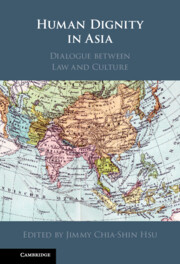Book contents
- Human Dignity in Asia
- Human Dignity in Asia
- Copyright page
- Dedication
- Contents
- Editor and Contributors
- Preface
- Abbreviations
- Introduction Human Dignity, Human Rights, and Cultural Change in Asia
- 1 Human Dignity in Indian Constitutional Adjudication
- 2 The Development of Individual Dignity in Japan
- 3 Constitutional Discourse on Human Dignity in South Korea
- 4 Human Dignity in the Jurisprudence of the Taiwan Constitutional Court
- 5 The Human Dignity Factor
- 6 Human Dignity in the Jurisprudence of the Indonesian Constitutional Court
- 7 Dignity as a Constitutional Value in Hong Kong
- 8 Human Dignity and Relational Constitutionalism in Singapore
- 9 Personal Dignity under Chinese
- 10 Virtue, Dignity, and Constitutional Democracy
- 11 Buddhist Philosophical Approaches to Human Dignity
- 12 Dignity and Status in Ancient and Medieval India
- 13 Human Dignity, Pancasila, and Islam
- 14 Catholicism and Human Dignity in the Philippines
- 15 Protestantism and Human Dignity in South Korea
- Index
Introduction - Human Dignity, Human Rights, and Cultural Change in Asia
Published online by Cambridge University Press: 26 July 2022
- Human Dignity in Asia
- Human Dignity in Asia
- Copyright page
- Dedication
- Contents
- Editor and Contributors
- Preface
- Abbreviations
- Introduction Human Dignity, Human Rights, and Cultural Change in Asia
- 1 Human Dignity in Indian Constitutional Adjudication
- 2 The Development of Individual Dignity in Japan
- 3 Constitutional Discourse on Human Dignity in South Korea
- 4 Human Dignity in the Jurisprudence of the Taiwan Constitutional Court
- 5 The Human Dignity Factor
- 6 Human Dignity in the Jurisprudence of the Indonesian Constitutional Court
- 7 Dignity as a Constitutional Value in Hong Kong
- 8 Human Dignity and Relational Constitutionalism in Singapore
- 9 Personal Dignity under Chinese
- 10 Virtue, Dignity, and Constitutional Democracy
- 11 Buddhist Philosophical Approaches to Human Dignity
- 12 Dignity and Status in Ancient and Medieval India
- 13 Human Dignity, Pancasila, and Islam
- 14 Catholicism and Human Dignity in the Philippines
- 15 Protestantism and Human Dignity in South Korea
- Index
Summary
This introduction offers background problematics and theoretical frameworks of this book, in addition to introducing all other chapters. First, I note that the minimum core of human dignity can be captured by such conceptions as elevated rank, intrinsic worth, and anti-humiliation. Since the 1970s autonomy has risen to prominence. Second, populism and polarization in Western democracies, insofar as it is related to what Ronald Inglehart and Pippa Norris call “cultural backlash,” signals tension between dignity as individual autonomy and other competing social and communal values. Third, in the post-Asian-values-debate era, a great part of Asia has progressed toward or become liberal democracies, and human dignity and human rights are embraced as universal values. This book regards culture as contestable and fluid set of meanings and symbols that is subject to change, even though cultural changes may be path-dependent and cultures cannot be totally fluid in its entirety at a limited historical period. Fourth, Asian countries have already and will continue to work out the full implications of these universal values by applying different conceptions of dignity to concrete issues.
- Type
- Chapter
- Information
- Human Dignity in AsiaDialogue between Law and Culture, pp. 1 - 20Publisher: Cambridge University PressPrint publication year: 2022

